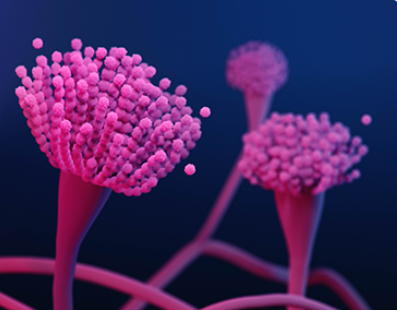Fungal Meningitis
Fungal meningitis is rare and is usually the result of the spread of a fungus through the blood to the spinal cord. Although anyone can get fungal meningitis, people with weakened immune systems, like those with HIV infection or cancer are at greater risk.
Types of fungi
Some fungi can cause diseases in plants such as mildews, rusts, scabs or canker leading to severe economic loss in the agricultural industry. A very small number of fungi cause diseases in animals. In humans, these include skin diseases such as athletes’ foot and thrush.

Crediit: CDC
Causes of Fungal Meningitis
Candida - C. albicans
It is the most common Candida species known to cause infections of the central nervous system (CNS, brain and spinal cord)
Coccidioides
This fungal species is particularly prevalent in the southwestern parts of the United States and Mexico. A third of patients presenting with coccidioidomycosis have developed meningitis.
Histoplasma
This fungus is found in bird and bat droppings and is found in regions of the United States, South, and Central America. CNS infection occurs in 10-20% of histoplasmosis cases
Blastomyces
It is found in soil rich in decaying organic matter. Meningitis is an unusual manifestation of blastomycosis and can be very difficult to diagnose.
Cryptococcus (Cryptococcal meningitis)
This fungus is thought to be acquired through the inhalation of soil contaminated with bird droppings. C. neoformans is the most common pathogen to cause fungal meningitis.
Aspergillus
Aspergillus infections account for 5% of CNS fungal infections.
Symptoms
Symptoms of fungal meningitis are generally similar to those of other types of meningitis and include:
- a fever
- stiff neck
- severe headache
- photophobia (sensitivity to light)
- nausea and vomiting
- altered mental status (drowsiness or confusion)

Prevention
There are no vaccines that can prevent fungal meningitis. Treatment is through long courses of high dose antifungal medications with the length of treatment depends on the status of the immune system and the type of fungus that caused the infection. Treatment is however longer for people with medical conditions that include HIV, diabetes or cancer.








